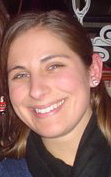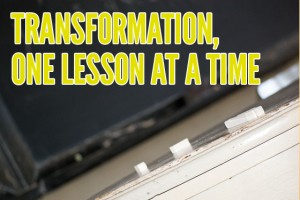Feeling a bit overwhelmed by all the talk about shifting your teaching to include more technology and student choice?
In her new Powerful Learning Practice e-course (5 weeks, beginning Feb. 6), iGeneration educator Jennifer Bloomingdale promises to help participating teachers achieve “Transformation, One Lesson at a Time.”
 Jennifer graduated from the College of St. Rose in 2006 with a Bachelors in Childhood Education. In 2011 she completed her Masters in Educational Technology and became a New York State certified Educational Technology Specialist. Jennifer taught in upper elementary for four years in Vermont, where she implemented 1:1 netbooks in her classroom. This past summer Jennifer also co-taught a high school course that helped students develop 21st century skills. Her passion for integrating technology, which grew from her graduate work and her extensive use of digital tools in her own classroom, influenced Jennifer’s decision this year to become an independent consultant and help other educators make the shift. You can read her Digital Portfolio here.
Jennifer graduated from the College of St. Rose in 2006 with a Bachelors in Childhood Education. In 2011 she completed her Masters in Educational Technology and became a New York State certified Educational Technology Specialist. Jennifer taught in upper elementary for four years in Vermont, where she implemented 1:1 netbooks in her classroom. This past summer Jennifer also co-taught a high school course that helped students develop 21st century skills. Her passion for integrating technology, which grew from her graduate work and her extensive use of digital tools in her own classroom, influenced Jennifer’s decision this year to become an independent consultant and help other educators make the shift. You can read her Digital Portfolio here.
In our interview with Jennifer, we asked her about her plans for the e-course and her own story of transformation.
____________
1. Give us the 1-minute, while-running-down-the hall description of your e-course. What’s being transformed? And why one lesson at a time? Sounds intriguing.
I think what is being transformed depends on the individual. I’m expecting that participants are coming into the course with their own professional goals in mind. My hope is that this course will be flexible enough that each person will be able to reach his or her own goal. Some might change the way they view their role as a teacher, others might change their expectations for themselves and their students, while others might change the way they view the content they teach.
To me, one lesson at a time is important because making any change in the classroom can be overwhelming, and I am a strong believer that taking little steps and being patient with yourself will eventually lead to the bigger changes you want to see.
2. Did you feel some anxiety when you began shifting your teaching to better serve 21st century students? What gave you the determination to stick with it? There are always pressures to revert to traditional practices, we know.
I definitely felt some anxiety as I began shifting my teaching, and I was still shifting when I moved from the classroom to my new consulting role in 2011. We’re always learning!
In my classroom I was always thinking, “Next time I’ll do it this way.” There were several things that gave me the confidence and determination to keep at the work of changing. First were my students. I loved seeing how excited they were about learning. Another was my supportive administration and coworkers. My administrators gave me the freedom to make these changes in my classroom and I had some great coworkers who always gave me the little push I needed. I also took advantage of as many professional development opportunities as I could. This allowed me to see other teachers making successful changes, and I was able to build up confidence and countless resources.
Even if you don’t have a super-supportive administration or eager coworkers, you can find much of the encouragement you need in virtual teacher communities like this e-course.
3. How do you plan to structure the 5-week course? Do teachers bring their own lesson or unit to the table?
My goal is that each participant will bring a lesson that they have taught in the past, or a specific topic, to the course. As we talk about 21st Century ideas each week, participants will integrate the concepts that best apply to them and their lesson or topic.
4. What grade levels or subject areas will benefit most from this course?
Since the concepts addressed in this course are for 21st Century Learning and participants are bringing their own lessons to the course, I think any grade level and subject area can benefit from Transformation, One Lesson at a Time.
5. This sounds like the course a lot of teachers are looking for to move forward with their teaching. Who else might benefit from the experience? Do you see a benefit for school instructional leaders — coaches, principals, APs?
I think instructional leaders would benefit by gaining more insight into the teacher perspective — what it’s like to make a change in the classroom. They’ll also be introduced to resources that can help them support their teachers as they work to shift their instruction. Since a majority of the class is developing a lesson, they might draw on the curriculum from their schools to create a model lesson or other resource for their teachers.
6. You’re devoting one of your five sessions to Assessment. We’ve noticed that in traditional PD, the word “assessment” often provokes yawns or frightened looks. What’s exciting about assessment in a transforming classroom?
As I made changes to my curriculum I began to view assessment differently. Rather than constantly testing my students, I started to think about what my students could “do” to show me what they learned throughout a unit. By devoting a session to assessment, my hope is that we can talk about different types of assessment, what assessment looks like in a 21st Century classroom, and how teachers can use ongoing assessments to improve instruction day by day. We’ll also consider how to incorporate new assessment ideas into traditional grading systems.
7. What else would be great for participants to know about Transformation: One Lesson at a Time ?
While there may be many concepts covered throughout the five weeks, I want teachers to take what works for them and apply it in a way that best fits their own classroom and students. I hope that as participants make one successful change, they’ll be energized to look at other places in their curriculum where they can integrate concepts from this course.
By moving ahead one lesson at a time, they’ll soon discover the transformation is well underway!
Register now and join fellow educators who are ready to bring 21st Century teaching ideas into their classrooms!
Latest posts by Powerful Learning Practice (see all)
- Hurry, you do not want to miss out on this… - November 3, 2020
- Resist the Urge to Quit Prematurely - October 26, 2020
- Let’s Move Past Feeling Disconnected from Your Students. Words Matter - October 24, 2020



Hi Jennifer,
This interview doesn’t tell me much about the specifics of your e-course. Can I find an outline somewhere – or can you email me one? I need to know more before considering it.
Thanks,
Julie
Julie – follow this link and click on Framework & Schedule.
http://plpnetwork.com/transformation-one-lesson-at-a-time-ecourse/